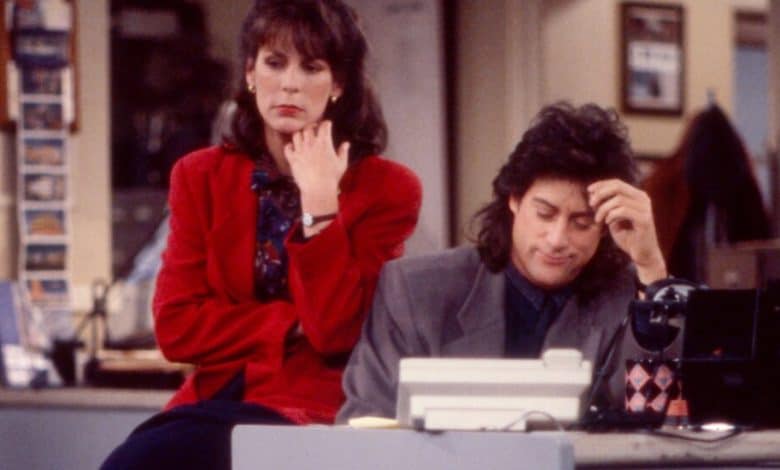With Richard Lewis, Kvetching Was Charismatic

In the 1980s, Jewish characters were scarce on television. There were broadcasters (Howard Cosell) and the occasional talk show host (Joan Rivers), but no Jews leading a cast on prime time. Then in the final year of the decade, that changed, and a glut of anxious men arrived, kvetching, quipping and dating shiksas.
Jackie Mason had his own sitcom, short-lived; Jerry Seinfeld had his, a classic. Then the following year, Rob Morrow played a Jewish doctor fish-out-of-watering in Alaska on “Northern Exposure.” But to my young Jewish eyes, none of them was as charismatic as Richard Lewis on the sitcom “Anything but Love.”
Constantly grappling with a thick mane of hair, he played a smart Chicago journalist who charmed his love interest, played by Jamie Lee Curtis, whose royal status back then was derived from being pursued by an only slightly more relentless man in “Halloween.” Whereas Michael Myers paced calmly in a silly jumpsuit, Lewis bellyached in moody black outfits. For those who know him as the cranky friend of Larry David on “Curb Your Enthusiasm,” it may be a surprise that Richard Lewis, who died at 76 this week, cut a seductive figure: clever, cool, darkly morose.
“Anything but Love” didn’t have the inspired absurdity or cutting wit of “Seinfeld,” and it began with the most sentimental theme song in the history of television. (Second place: “Family Ties.”) But Lewis brought a nervy energy that pushed against the saccharine instincts of network sitcoms. If he seemed like a new kind of Jewish neurotic comic, he built this persona in comedy clubs. His stand-up was full of stories about his love life that somehow managed to be self-deprecating and glamorous. He once told David Letterman, “The woman I’m with now insisted on having intercourse only with a raven on her shoulder.”
William Knoedelseder’s book “I’m Dying Up Here,” about stand-up in the 1970s, presents Lewis as the Lothario of the scene, dating stars like Debra Winger and once picking up a Danish baroness at the Improv in Manhattan with this line: “I’ll take you out for a tuna fish sandwich anywhere in the city.” It worked.
Lewis belonged to a class of young stand-ups, like Seinfeld and Bill Maher, who were influenced by the acerbic Everyman persona of Robert Klein. But Lewis eventually developed a frenetic, jazzy style that also owed something to chaos agents like Mel Brooks and Robin Williams. His jokes were delivered with rollicking energy, making misery a full-body exercise, slumping, pacing and, most of all, gesticulating. His comedy had choreography, a visual language of pointing, air-sawing and face clasps. To say he talked with his hands seems insufficient. His whole body never shut up.